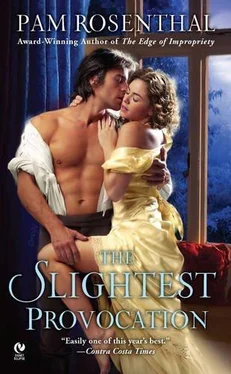“Back to England today!” She pushed the spectacles back over the bridge of her nose. “But you said…”
“I lied. Well, no, I didn’t, not exactly. I exaggerated-rearranged a few points. There were a great many details to attend to, official ones, rather… Letters of introduction-oh, but I told you that part, didn’t I? Anyway, I got them done quickly. The position I’m after…”
She wouldn’t allow him to draw her into another argument. “Yes. Well. I’m sure we’ll manage to pursue our separate courses in town. Your confreres at White’s, the girls at Mrs. Goadley’s, will all be delighted, I’m sure, to welcome you…”
“The position at the Home Office…” His voice was firm, though his gaze flickered for a moment-defiant, even if half-abashed at his evident need to emphasize it.
“You already told me. You fancy a minor position in one of Lord Liverpool’s government’s smaller ministries.”
“You find it unlikely?” he asked.
“Well, if someone were to ask me who the most ungoverned personage I’d ever met was, I shouldn’t have to think awfully hard about it. Shallow, callow…”
“I’ve been nine years at war, Mary. Give me credit for having learned a little organizational ability, a few things about power and administration and the flow of intelligence…”
“You can barely stand up, and you’ve clearly spent the last few hours with your head over a basin.”
“Fortunately, she was kind enough to leave me with one in reach. Whereas you, Lady Christopher…”
“I slept quite well, thanks.”
“You slept unaided?”
“I took something for headache.”
“My point exactly.”
She’d let him have that one. Still, “You thought you needed only to stride back into view for me to put aside a perfectly well-regulated, carefully constructed, and really quite satisfying…”
“Yes, you keep telling me how satisfying…”
“Must you interrupt me? An extremely satisfying life-as though it would have been a simple business for me these last years, for any woman whose husband left her so suddenly and scandalously…”
“I didn’t think…”
“No, you didn’t.”
He opened his mouth and then closed it without having said anything.
“While in the matter of the Home Office, Kit, you obviously don’t understand…”
“You made it clear enough last night, the veritable encyclopedia of things I don’t understand. No, please, don’t pout. You’ve already proved yourself a woman of action. Look at all the heavy kitchen pottery on that dresser. Here, I’ll get you a pitcher to toss at me.”
She shouldn’t have begun ragging him on about politics. Especially, she thought, after her decorous little speech about their separate courses.
“I must go. The packet boat will be leaving soon. I’ve got quite a bit of traveling before I’m home again in Derbyshire.”
He shrugged. “Dismal place. Just as well that I’ll be too busy to come down. Difficult to avoid each other in such a small, close neighborhood.
“And anyway,” he continued, “we shouldn’t be seen together any longer. Not if you want me to bring suit against your friend Mr. Bakewell. The divorce courts don’t look kindly on collusion.”
So he knew about Matthew.
She tried to push her spectacles higher on her nose, but they were already quite as close to her eyes as they could be. She could see him most clearly as he explained what bringing suit for a divorce would entail.
He should have to sue the man for alienating her affection, then bring suit against her for adultery in ecclesiastical court, and only then petition Parliament for their Act of Divorce.
“ If I can afford to do so. It costs about a thousand, you know.”
Again, he stressed the necessity that they not be seen together upon their return to England. If it appeared that he and she had planned this, the government would reject his petition for divorce.
An exceedingly lucid presentation, especially coming from someone who’d spent the night with his head over a basin. His eyes were red, his posture increasingly unsteady, and (when he leaned forward to make a particular fine distinction), the smell of his breath was really quite dreadful.
“Of course, you and your Manchester manufacturer must become demonstrably adulterous. And I shall have to hire spies, you know, to catch you at it.”
Your Manchester manufacturer -reeking and disreputable, he’d still managed a most fastidious, Stansell-like curl of the lip.
She ignored it.
“Spy away,” she said. “He wants us to be able to marry, and he’s willing to bear the scandal. We both are. He’ll be returning to England for Midsummer Eve. Just don’t set your spy on us at Beechwood Knolls, I beg you. I shall be leaving soon after midsummer. Wait and keep my family out of the business.”
“Your servant.” His bow was less than graceful. “My congratulations. He sounds a splendid fellow. Too bad I shall only make his acquaintance indirectly, through the legal process.”
“Yes, it is too bad. But then, you won’t be crossing paths with us very often. You’ll doubtless marry again as well, to a lady of great dash and ton. Who will admire you. And your position in the government.”
But here, mercifully, was Thomas in his newly brushed mulberry Rowen velvet. For the coach was ready, the lady’s things were all packed up (yes, and a very good morning to you, Lord Christopher), and they must, indeed, depart directly.
Which (thank you, Thomas) the lady was altogether eager to do, wishing as she did to put the width of the Channel between herself and his lordship-who had, in any case, already turned away, all shaky, aggrieved, crapulous dignity, and allowed his valet to lead him back upstairs.

LONDON, LATER THAT WEEK
“I’m hardly surprised.” Richard Raddiford Mor rice’s northern voice made a soft rumble against the cluttered room’s bookshelves, paneling, and purple drapery at the windows.
“For the two of you would wait until the last possible moment,” he continued, “to build up the suspense, set the level of histrionics as impossibly high as you could manage. Your final night on the continent-quite banal, really, Mary.” His steel pen glinted in the lamplight above a sheaf of papers, held with a slightly unsteady hand.
Mary groaned from the depths of a plush armchair in the room’s far corner. “You’ve been writing your newspaper’s theater criticism of late, Richard.”
“To my shame. But for the next issue I’ll be taking on a new chap to do it. Young and eager, far better educated at his dissenting academy than Kit and I at Oxford-got more learning in him, for that matter, than Kit, I, and a goodly percentage of the House of Lords taken together…”
“But in the main,” she continued, “you’re quite correct. We were worse than histrionic. We were stupid, impatient, and less tolerant of one another than ever. Without even our youth to excuse us.”
For a few minutes, the only sound in the dimly lit room was the low fire’s crackle.
“Still, it’s the only thing.” Richard’s response seemed to come from a distance away. “Divorce, I mean. Both of you starting your lives afresh-it’s what you need. Though I must confess that I’d rather hoped otherwise.”
“You’re very forgiving,” Mary said.
“I’d like Kit to forgive me as well,” Richard replied.
She’d made Richard’s acquaintance soon after her marriage. Kit had sometimes spoken of a friend and protector at Eton. But their paths had diverged at university, Richard passing his examinations in the undistinguished fashion befitting his station while Kit got sent down for dueling and riotous behavior. Bumping into each other in London, however-Richard setting up at the Albany just when Kit and Mary had taken the house in Curzon Street-the two had enthusiastically resumed their friendship and Kit had invited Richard to dine with them at home.
Читать дальше













